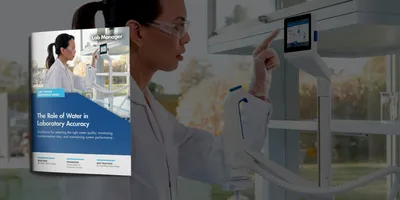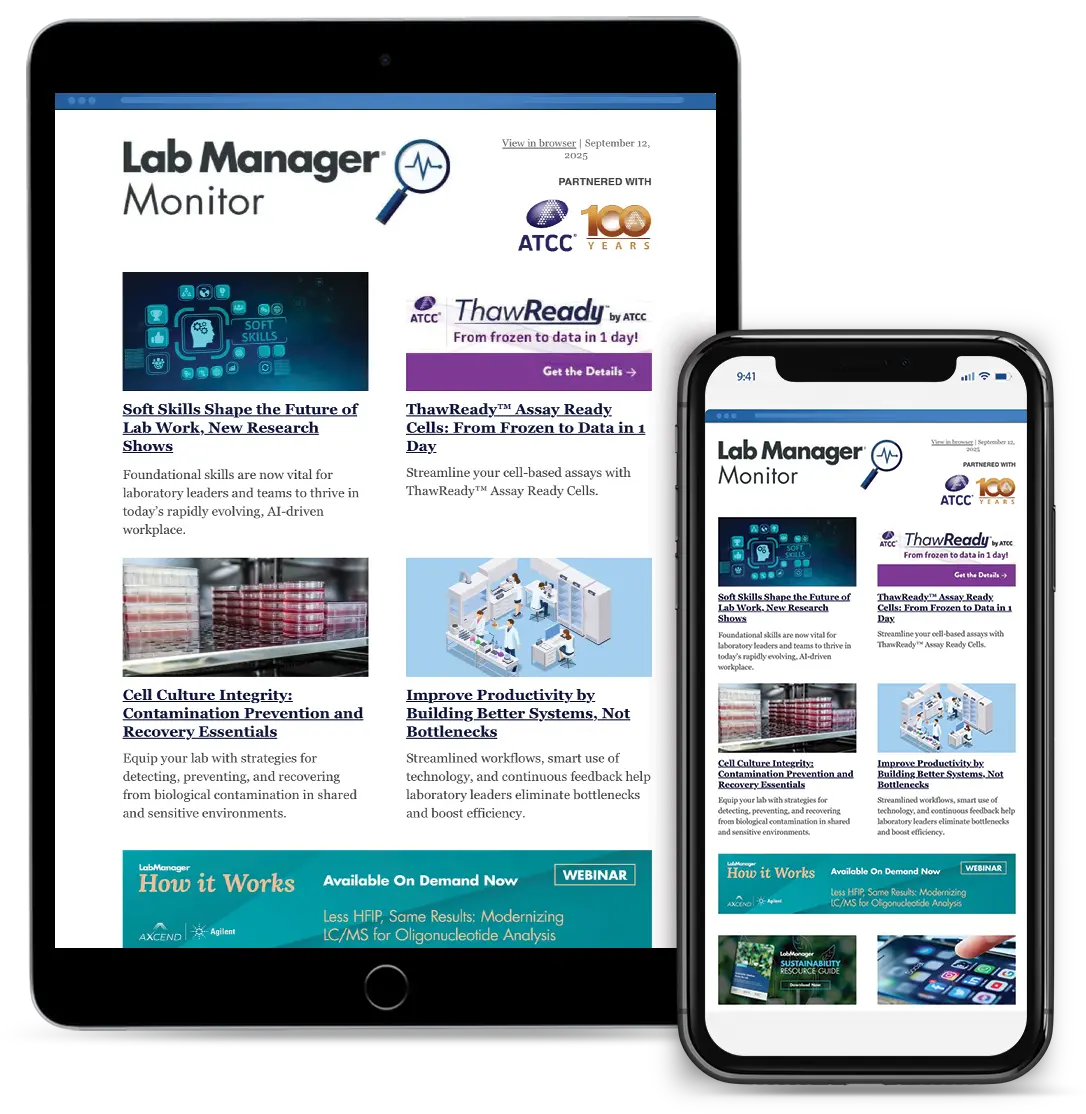Chromatography is at a turning point. Demands for faster results, greater accuracy, and greener practices now collide with breakthroughs in digital technology. This convergence is driving fundamental changes in how laboratories operate, from the instruments they purchase to the skills their teams need. In this article, experts from SCIEX, Thermo Fisher Scientific, and Cytiva explain how these forces are reshaping chromatography, and what lab managers can do to stay ahead.
What the experts are saying: key trends
The following expert perspectives highlight the most important shifts influencing chromatography today and forecast how they will shape the field in 2026.
1. Holistic, multi-class analysis
Craig Butt, senior manager, Applied Markets, SCIEX:
In recent years, there has been a significant focus on various factors that impact our environment and bodies—PFAS contamination everywhere, mycotoxins in crops, veterinary drugs contributing to antimicrobial drug resistance, carcinogenic pesticides, and UV filters harming coral reefs, among others. What is becoming clear is that these factors intertwine and have to be viewed and tested together. What’s in the water impacts the fish we eat, impacts the plants we water, and impacts the food we consume.
In the future, we see a need for targeted screening of multi-class chemical pollutants to better safeguard our environment and food supply chain. To better understand the impact on human health, we have to look at these chemicals together, not in isolation.
Key takeaway: Prepare for broader testing panels and adopt workflows that can analyze complex, multi-class datasets.
2. The central role of automation and AI
Greg Staples, senior director, product management, Thermo Fisher Scientific:
A major trend is the integration of artificial intelligence (AI) and machine learning (ML), which will be used to optimize method development, predict chromatographic outcomes, and enhance data analysis.
Ultimately, the growth of AI may also ease the high demand for technically skilled operators and allow scientists to concentrate on results, rather than ion chromatography (IC) system mechanics.
Martin Ruehl, director, HPLC product management, Thermo Fisher Scientific:
Looking ahead, liquid chromatography (LC) instrumentation will continue to evolve, with improvements in detectors, columns, and system design that enhance performance, reliability, and sustainability.
Automation and digitalization will continue to expand, supported by AI and ML, to optimize separations, predict outcomes, and enhance data analysis. These advances will drive greater efficiency and accuracy across workflows.
Key takeaway: AI will ease repetitive tasks and reduce reliance on highly skilled operators; however, labs should retrain their staff to manage AI-driven systems and interpret results.
3. Miniaturization and hyphenated techniques
Greg Staples:
Looking ahead, the practice of ion chromatography is expected to be shaped by several key trends. Hyphenated techniques, such as combining IC with mass spectrometry (IC-MS), will become more widespread and will provide greater sensitivity and selectivity for complex samples. We also expect to see further miniaturization of systems and consumables, allowing for portable, on-site analysis and reduction of eluent waste.
Key takeaway: Adopt modular, portable systems that reduce solvent use and operating costs while expanding on-site testing capabilities.
4. Sustainability as a strategic imperative
Martin Ruehl:
Environmentally friendly methods have gained traction, with labs using less toxic solvents and reducing solvent consumption. This trend aligns with the growing emphasis on sustainability and the demand for transparency around instrument energy use, resource consumption, and packaging.
Clement Bassens, general manager, fiber chromatography, Cytiva:
Membrane chromatography (MC), traditionally used for polishing, is now being adapted for capture steps—especially protein A affinity—driven by the need to reduce clinical manufacturing costs and handle larger biologics.
Additive manufacturing has enabled more efficient device designs with lower hold-up volumes and easier scalability. Innovations that combine convective and diffusive elements are increasing membrane capacity and performance. Looking ahead, hybrid workflows combining membranes and resins will become standard.
New membrane materials will enhance binding capacity and reduce costs, while a sustainability focus—including regulatory alignment and device recycling—will drive eco-friendly designs and processes.
Manager takeaway: Begin embedding sustainability into purchasing and workflows now. Solvent reduction, recyclable device adoption, and buffer management planning will soon be mandatory.
5. Evolution in biopharma and personalized medicine
Kerstein Pohl, senior global market development manager – bioPharma CE, SCIEX:
Vaccine development and hesitancy is a highly debated topic right now. mRNA vaccine development has moved from emergency use to full approval status in the United States, which makes more treatments possible. On the other hand, vaccine hesitancy also brings up concerns about safety and efficacy. Analytical science is a key player in this space as we discover more ways to ensure vaccine safety and support development.
Martin Ruehl:
LC will also play a central role in personalized medicine, enabling detailed biomarker analysis and precise quantification of therapeutic drugs to support tailored treatments.
Clement Bassens:
MC is expected to see broad adoption in advanced therapies and personalized medicine development due to its scalability and ability to handle large molecules.
Key takeaway: Personalized medicine and advanced therapies mean smaller, variable batch sizes. Chromatography investments must align with these evolving clinical and manufacturing demands.
These insights underscore a future where chromatography is faster, smarter, and more sustainable—demanding lab managers to think strategically about technology, people, and processes.
How lab managers can prepare for the upcoming year
To ensure their labs remain competitive and successful, lab managers should take a proactive and strategic approach.
- Invest strategically in technology, prioritizing modular design and advanced, upgradable software. This foresight enables the adoption of new technologies, such as AI and automation, safeguarding your investment.
- Start preparing your team for a smooth transition by testing AI tools now, and prioritize professional development for staff in the new software, data analysis, and maintenance.
- Evaluate workflows and adopt smaller ID columns and reagent-free systems to cut waste and costs. For new membrane-based workflows, plan early for buffer demands and management.
By focusing on these three areas—strategic investment, staff training, and sustainable practices—lab managers can successfully navigate the evolving landscape of chromatography and set their labs up for long-term success.















